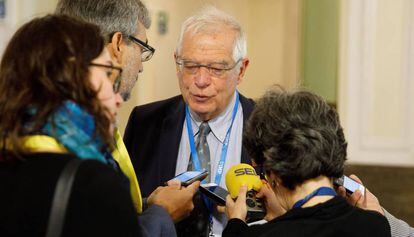Spain’s foreign affairs minister not ruling out time zone change
Comments come after European Commission proposal that would bring an end to the twice-yearly changing of the clocks by one hour across the continent

Spanish Foreign Affairs Minister Josep Borrell did not rule out on Friday a possible change of time zone for Spain, one that would be more in line with its geographical location. The comments came in the wake of a proposal from the European Commission that would bring an end to the twice-yearly changing of the clocks by one hour.
“Perhaps Spain should be in another time zone,” the minister told reporters on Friday after a meeting of EU foreign ministers in Vienna. “Frankly, I don’t know. Let’s give the European Parliament an opportunity to see if it is able to find a common denominator between countries that are in such different geographical situations.”
In 1940, then-dictator Francisco Franco pulled Spain out of Greenwich Mean Time as a gesture of goodwill to Nazi Germany
In 1940, then-dictator Francisco Franco pulled Spain out of Greenwich Mean Time [GMT+0] as a gesture of goodwill to Nazi Germany. While geographically Spain should be on the same time as the United Kingdom and Portugal, its clocks are in the same zone as countries as far east as Poland, meaning fewer hours of light in the morning, and more in the evening.
Borrell added that the EC’s proposal – which was announced today after the results of a public poll were released, in which there was overwhelming support to end daylight saving time – would have to be debated in the European Parliament, where “all countries would have to explain their point of view and to what extent this would favor or otherwise processes of work-family balance, the adaptation of timetables to the hours of daylight, and energy consumption.”
He admitted that he was no expert on the subject, but said that “Laplanders would no doubt see it differently from the Portuguese.” Asked if he would rather the summer timetable or winter timetable were preserved, he said he was indifferent. “My timetables are continuous in winter and in summer,” he said.
The EC announced on August 17 that the public poll on whether or not daylight saving should be abolished attracted a record number of participants, with 4.6 million people from the 28 countries of the European Union taking part via an online questionnaire.
“Parliaments from each country will have to explain how this would affect citizens from each country,” Borrell continued. “That’s the great virtue of the parliamentary assembly, which is often said to be of little use. This is the proof that it will have to make a decision about a problem that affects the life of the people, the economy and energy consumption.”
English version by Simon Hunter.












































